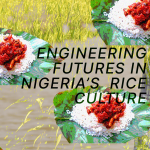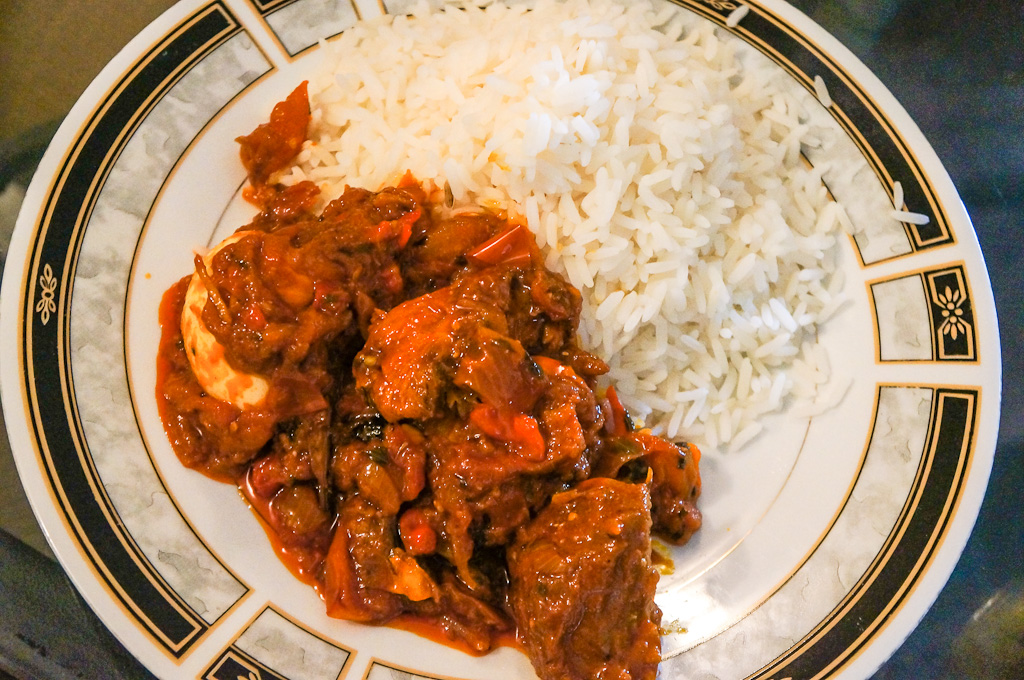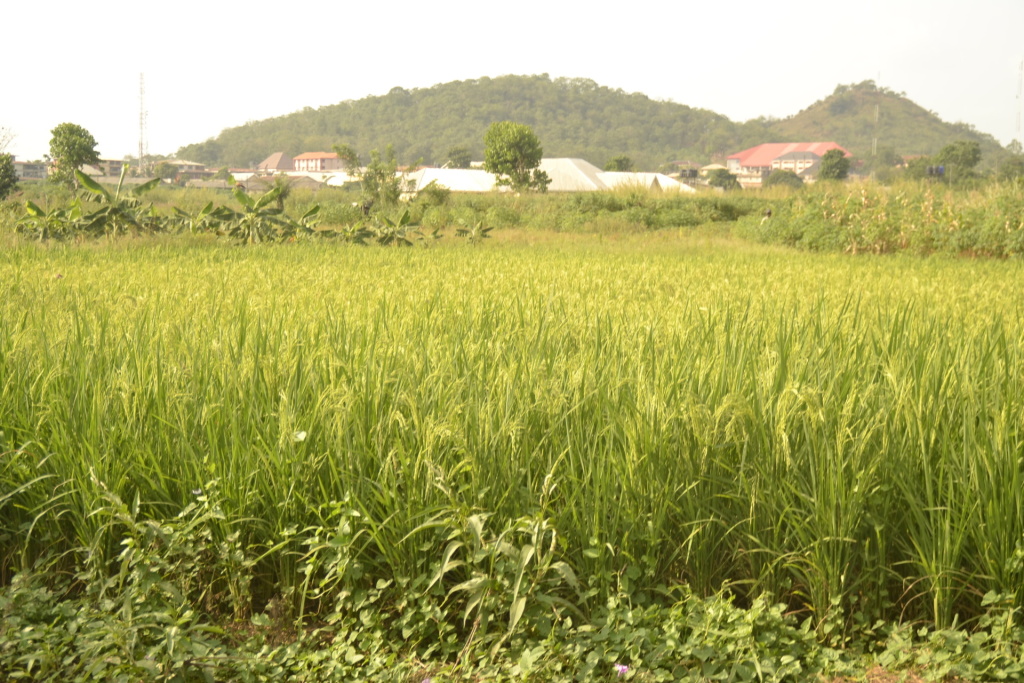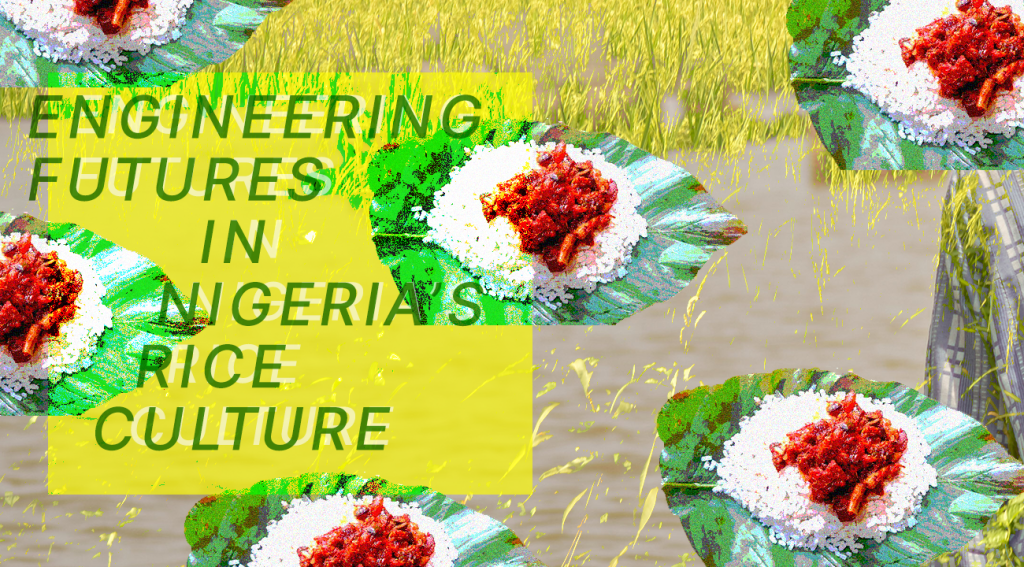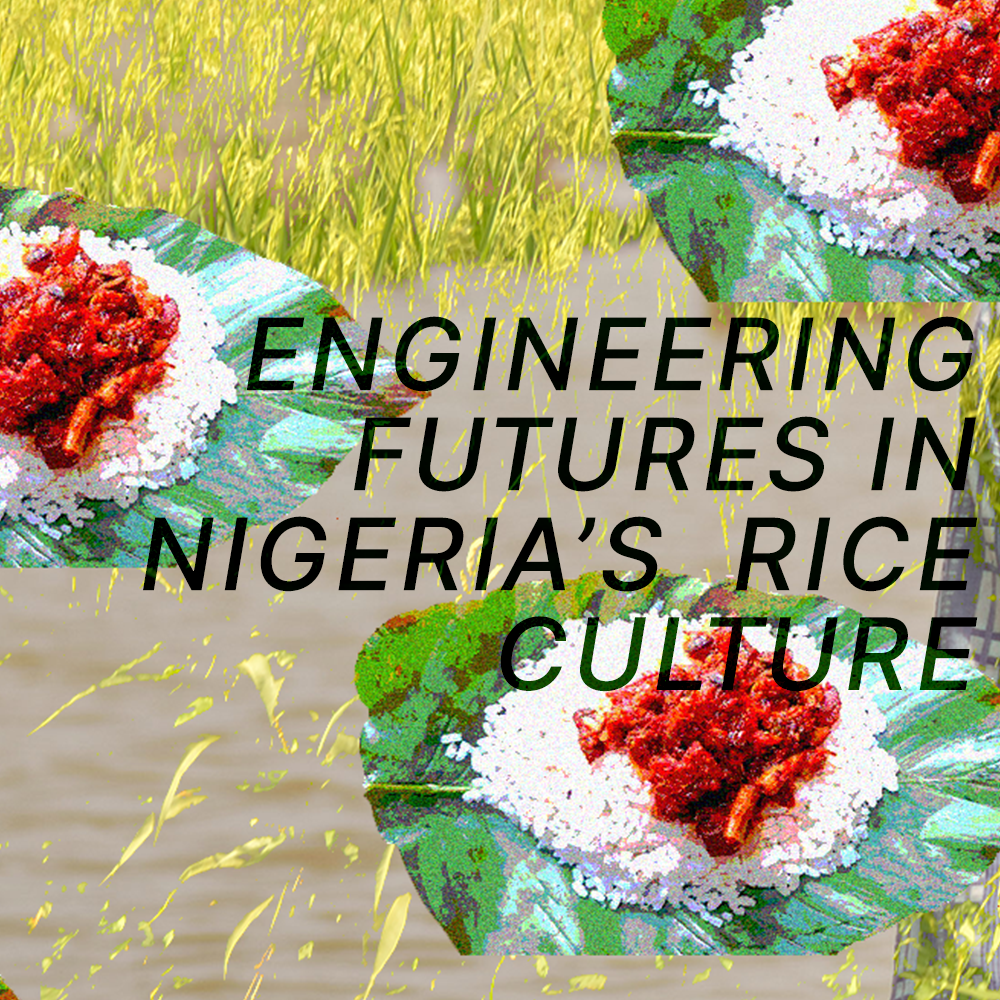Saturday, the 12th of November, 2022, was the wedding ceremony of the daughter of my late mother’s distant relative and they had called me to attend—I did not know these people. I stared at my phone for long, painful minutes, after that call, brooding over thoughts of an upcoming deadline two days later for one of my stories exploring Nigeria’s disastrous floods and the depletion of thousands of rice farmlands. That Saturday, I needed to work.
Before the call and any introductions to conversations about the wedding, my only knowledge of their existence was the intermittent, boring broadcasts this relative would send to my mother, inviting her to stop by their new family-owned home in one of Nigeria’s South-eastern states to eat rice.

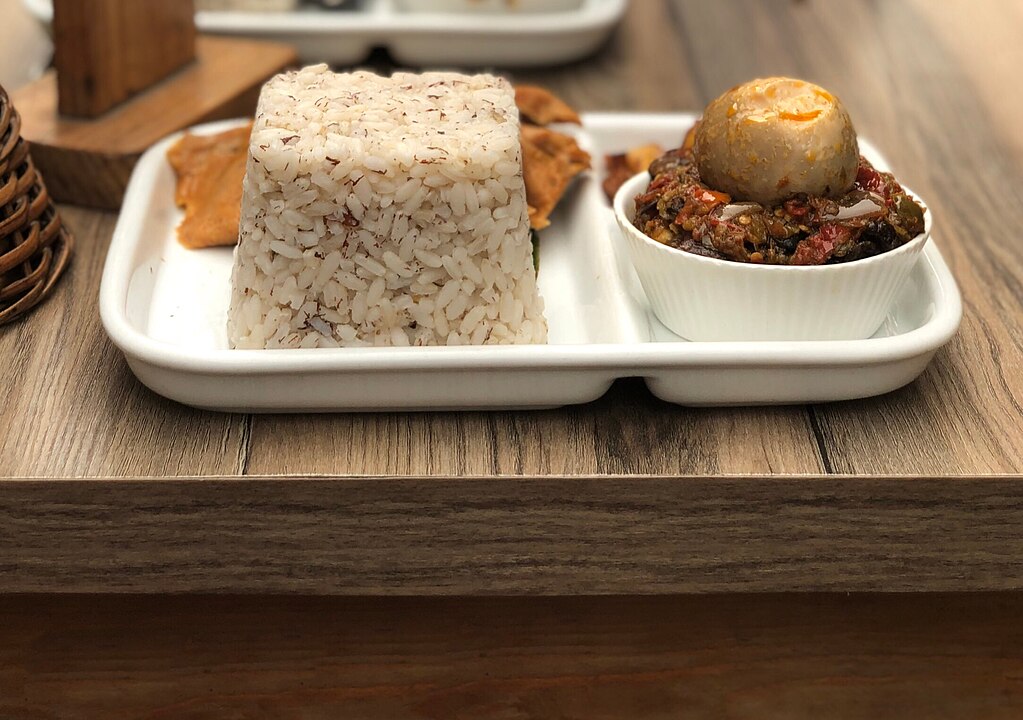
In the very broad vocabulary of Nigerian lingo, stopping to eat rice is not a literal statement. Sometimes it’s an invitation to luxuriate in the hospitality of a warm welcome, other times to enjoy assorted delicacies—in all—you know they’re inviting you for a good time. She was inviting us for a good time. In the context of convivial invites, only one food has the power to convey various interpretations of warmth and hospitality: Rice.
I did attend that wedding. Why miss a free pass at revelling in food, especially if the person hosting is a chef, or affluent? Both are nearly the same these days based on their proximity to well-cooked rice. Rice and beef stew, jollof rice, rice and beans (as jollof or with stew), rice and soup, rice and sauce, rice and literally anything. The Nigerian idea of rice is expansive; it’s moulded into balls and fried, ground into flour and baked, or mashed and made into pancakes.
How do you like it? It’ll be served shortly.
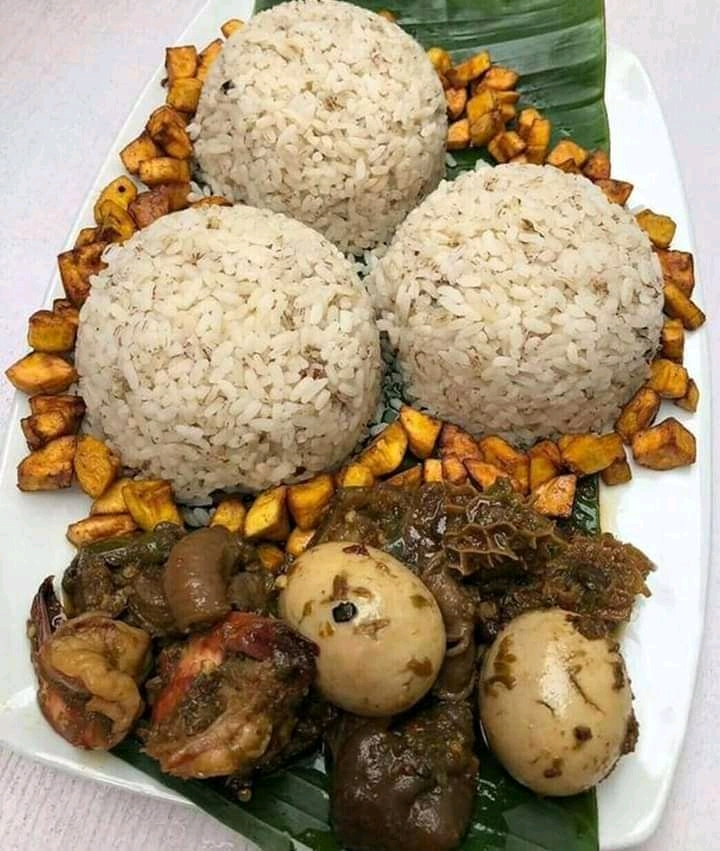
With hanging lights, petal shaped and swinging gently from their holders, and gold chairs drawn back with stealth by well-to-do Nigerians, the décor was that suited to hosting the community’s most influential. You just knew this event would serve good rice.
Soon enough, servers started to move around with trays of food plates, raising hopes, lighting faces. I caught the scent of Bitter-leaf soup and the warmth of half-boiled spinach leaves in Vegetable soup, and even fresh-off-the-grill chicken a while later for a different section of guests, but no rice. I could hear murmurs already, saw necks craned in not-so-subtle attempts at finding the rice, craned my own; this was the insatiable mind (or appetite) of the Nigerian middle class, who had drawn a perfect Venn diagram encompassing their presence, this wedding, and the availability of rice.
Pictured: Ofada rice, sauce and accompaniments, By Cherish Aurora, CC BY-SA 4.0 (top right)
Jollof rice and fried chicken (top left) and Ofada rice, plantain and stew (bottom right), By Bukky658, CC BY-SA 4.0
The Floods
There wasn’t any rice. There would be no rice. We watched as my relative took a mic, stood in front of the large gathering and began to speak.
“The floods destroyed my husband’s rice farm in the village,” she said, glancing warily to her side and taking a deep breath before continuing. “You know this family, we don’t treat people anyhow. The rice our farmers planted this year was one of the best in Anambra, but everything was destroyed by the floods. Ụnụ ma otu mmiri sị mee.”
Her last statement in Igbo, a popular language in South-Eastern Nigeria, was meant to elicit sympathy from her guests in an assumption that they had collectively heard of the floods. As she makes to hand the mic back to the MC, she adds a disgruntled “Bikonu, ghọta,” meaning ‘please, understand’.
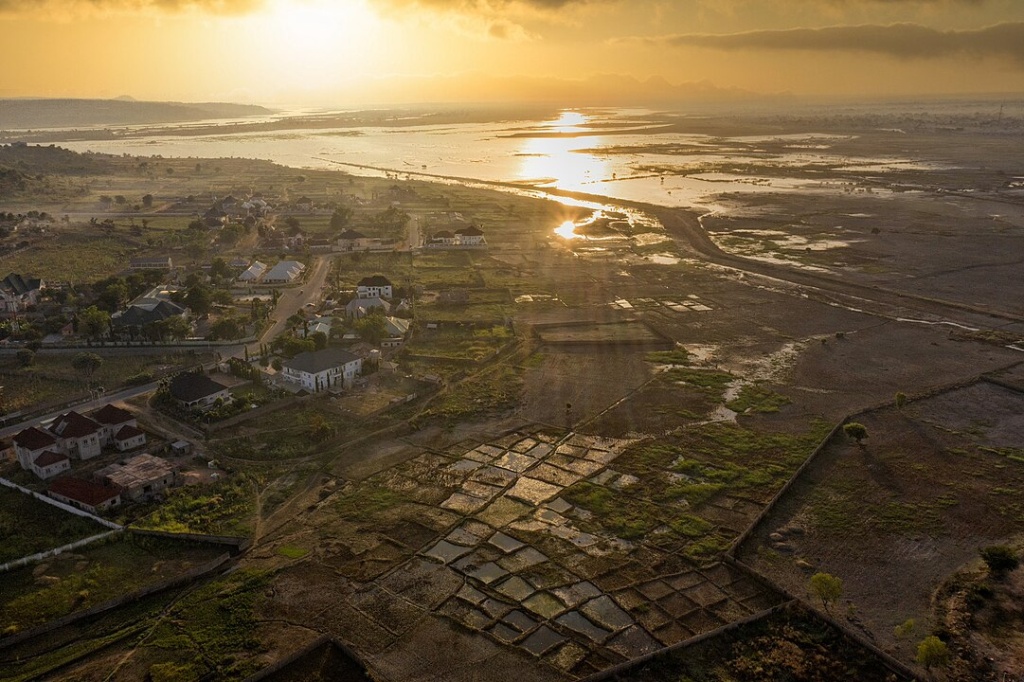
Flooded Yola – By Hauwa Mohammed – Own work, CC BY-SA 4.0,
I did understand, as much as anyone could, because the floods were truly disastrous in places like Anambra. That was my mother’s, and this relative’s, birth town. I had also just recently been speaking to a source from another affected state, Niger, for that story I was working on, about the impact of 2022’s floods on rice production. Her account of its direct impact on her family was heart-wrenching.
My article only interviewed small-scale, local farmers with a lower income, but now in a wedding, a middle-class, considerably well-off family, was proclaiming they were also gravely affected by it. That’s about the context needed to understand Nigeria’s food-insecure future. In this country, when the affluent mourn with the poor, the problem is out-of-bounds.
The floods were extreme, lethal. They were the most gruesome in a decade, coming prepared with all the force of human activities in the West and our government’s refusal to build strong dams, despite the availability of funding.
My relative’s farm, like many others, had become a statistic on account of the enormous loss last year during the floods. Like thousands of others. Reporting recorded that farmland submergence had covered over 4500 hectares or more by December last year.
Wedding guests pushed back local meals they were served, rejecting them quietly; they weren’t rice. It was impossible to miss the grimaces that covered their faces, like wet cloths on skin, paint on canvas. There was one obvious reason for this: They were underestimating the inaccessibility of rice because of how commonly distributed it is.
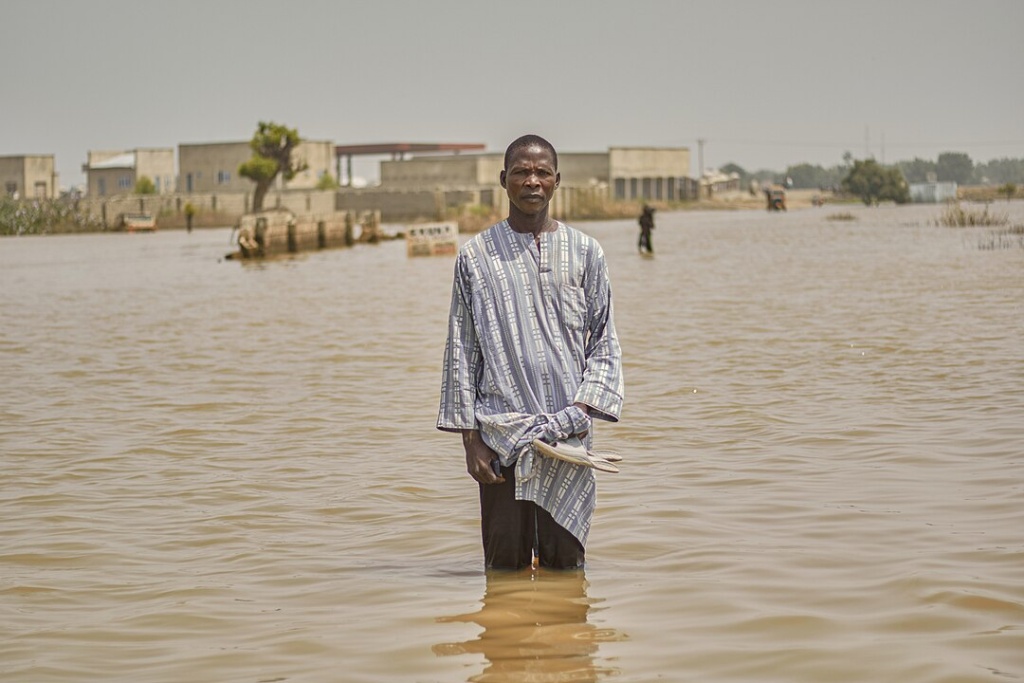
“Finding Home in the Stomach of a Flood”, By Sadiq Mustapha, Own work, CC BY-SA 4.0
I left the venue thinking about the possible death of rice production and its current dearth. With thousands of years of rice production in the region, Nigeria has become the major rice producer and exporter in Africa, and yet…
I mean, even the biggest rice farm in Africa by any metric, Olam, took a big hit from the floods. Situated on the outskirts of one of the Northern states, being Nigeria’s main source of rice exportation, Olam is part of a proposed corporate agricultural revolution in Nigeria, which had started with rice. But by October, about $15 million in rice crop and equipment were lost to the floods. Olam would have to start afresh.
Talking to Chef Obubu, who has served hundreds of events like the wedding, I hear a grave warning about the effect this is having, “The price of rice has skyrocketed so much that soon, people would begin to notice a significant nutritional decline.”
Like a slow but deadly poison, climate change is catching up with us, destroying farmlands here, sending families into abject poverty there, and straining the cost of agriculture everywhere.
The Potential of GM Rice
It’s becoming hard to see a food secure future for Nigeria, as it takes steady, confusing strides towards insecurity. Thanks to the floundering of our government and climate change, the opening of the Lagdo dam which was a leading cause of Nigeria’s flooding woes last year, will reoccur this year, and in a few weeks, the major food-producing states will once again, be cast into damnation. This is despite an assurance from our highly inept governing body that there wouldn’t be a repeat. It’s hard to say we’re not doomed to repeat this cycle.
But, possible solutions exist, and there are a couple we could implement in the near future to save rice from these climate-related ruins, and prevent it becoming a luxury item. For starters, the government could look to begin the construction of a protective dam that would take in overflowing water from the Lagdo, as was agreed in 1980.
However, this would only curb so much of the impact, as the intensifying rains in Nigeria cook up storms of their own.
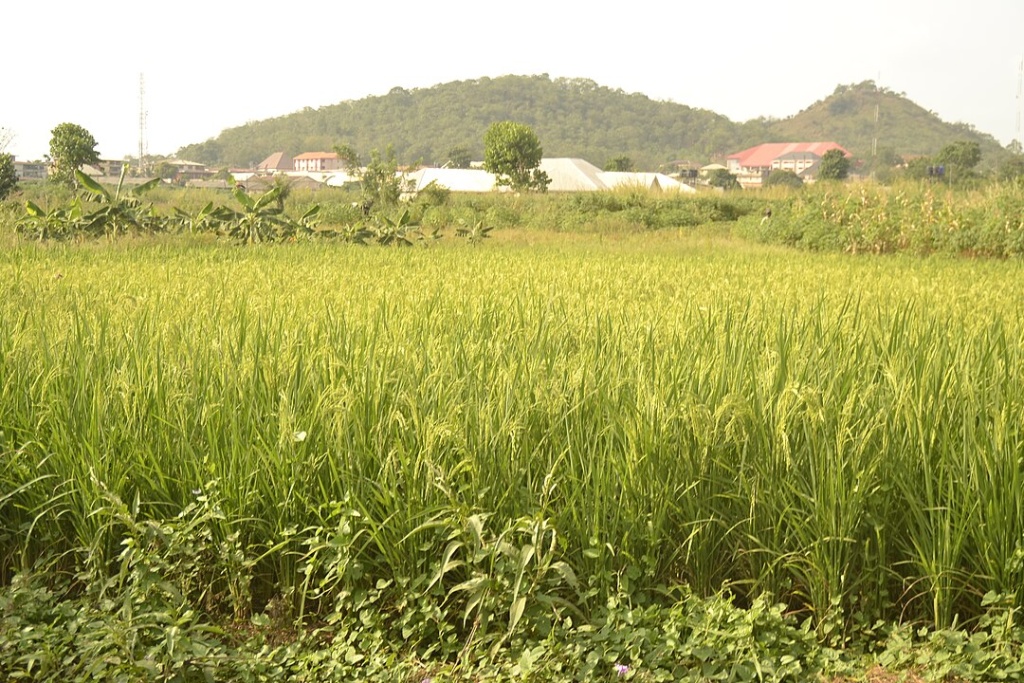
Rice growing in a field in South-East Nigeria, By Chukwukajustice, Own work, CC BY-SA 4.0
A solution that might actively tackle the climate impact on food production, in terms of crop retention—and one that Nigerians have a history of distrust for—is the proposed popularization of flood-tolerant and climate-resilient genetically modified (GM) rice amongst farmers.
Dr Rose Gidado, the director of the National Agricultural and Biotechnology Development Agency (NABDA) told me this when we spoke in a 15-minute call. “GM rice is what Nigeria needs to protect her food future and it’s what we’re working on. It’s the same as any other rice—safe—and will be able to resist climate change.”
Her words were so certain, almost making me hope, but then I thought about its 2016 reception (or rejection?) and frowned a little. Those beliefs don’t just fade. Before the revelations of climate change’s effect on rice production, NABDA had simply wanted to create a healthier variant of the food crop, but it faced massive protest.
Even The Guardian, one of Nigeria’s most widely read papers, somewhat implied that biotech foods were dangerous. The pushback was so immense that the government had to debunk any news about the it being introduced into the markets.
Nigerians can be rigid with how rice is eaten. In weddings, there should be rice, and if you’re serving rice, it must be what they know as rice. It is like a cultural ritual, and not keeping to this ritual in the way that they believe our ancestors did, is considered taboo.
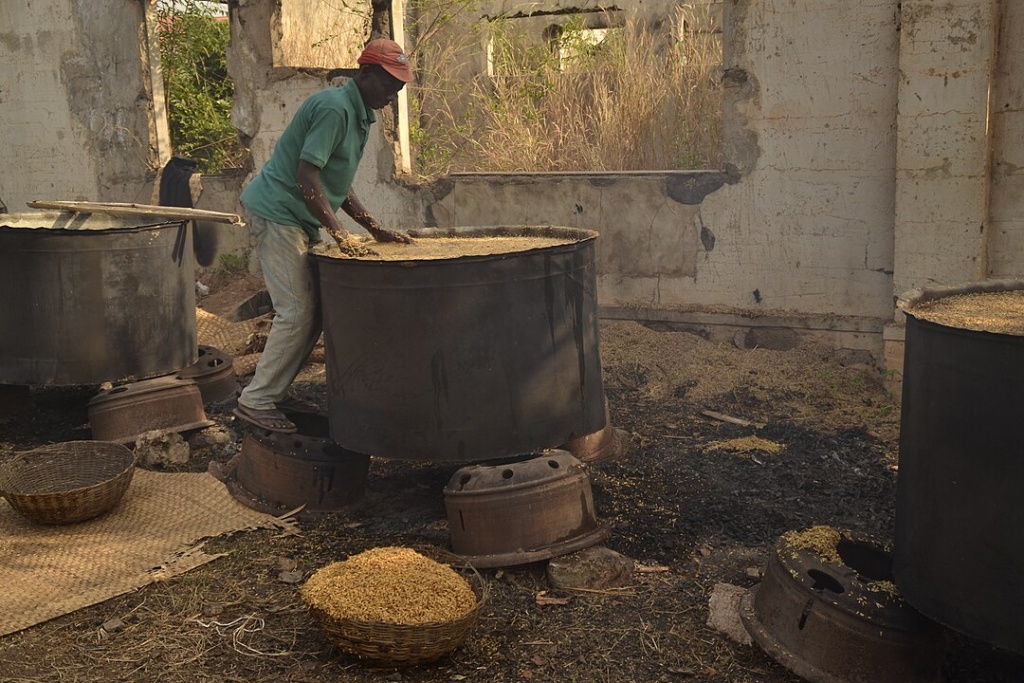
Rice Processing in South-East Nigeria, By Chukwukajustice, Own work, CC BY-SA 4.0
The Pushback Today
Dr Nnimmi Bassey, the Executive Director of the Health of Mother Earth Foundation (HOMEF), said in protest of GM foods: “Many times we think that food is neutral, just something you put in your belly and go. But food is more than that. Food is life and culture.” He also insisted that biotech foods are a farmer’s enslavement: the agricultural products of colonization.
NABDA has continuously tried to dispute HOMEF and Bassey’s claims as pseudo-scientific and not based on actual research, but Nigerians keep eating them up.
When I spoke to Dr Gidado about the potential pushback of GM crops in the future, her stance remained unwavering.“No, it won’t affect it again. I’m certain,” she told me, taking occasional pauses to spell out her words.
“Everyone is becoming aware of climate change and the country’s population size is increasing every day.” She assuredme of NABDA’s plans to implement some measures already. “What we need are investments to hasten the processes.”
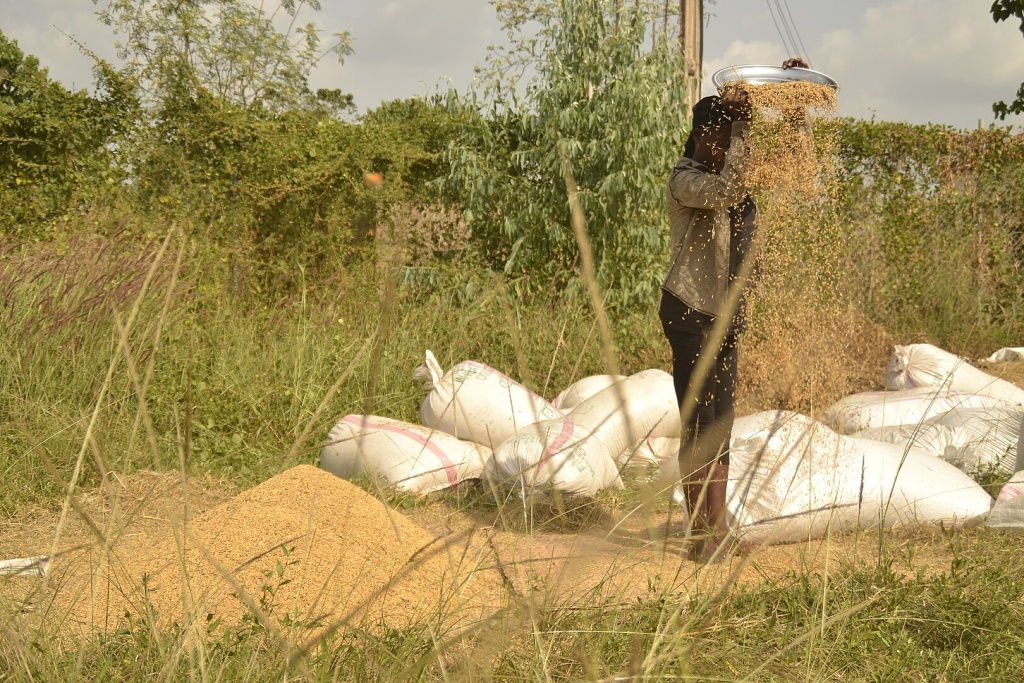
Rice Processing in South-East Nigeria By Chukwukajustice, Own work, CC BY-SA 4.0
But, Onyiah Jennifer, who sells rice bags in bulk quantities in Abuja, disagrees with Dr Gidado, sharing on-the-ground insights as to why GMO rice could not be popularized before, and why it may not be bought in the future. Her perspectives, in a way, explain why Nigeria is in the top six African countries adopting biotech agriculture, but has not signed off on its most endangered and most consumed crop. We spoke through WhatsApp voice notes and our talk was light-hearted and warm.
“Nigerians are very particular about food, especially one [rice] they’ve been eating for ages,” she said. So calmly, so sure—she had been waiting for my questions for a long time. “Anything with a feel outside of the traditional way of eating rice is feared, and if Nigerians are scared, they’ll run.”
She told me, pausing for some minutes before making another note. “GMO rice couldn’t even penetrate the market in 2016, it was barely a breeze, and they won’t in the future.” In her voice were intonations succinctly asserting GMO rice’s purchasing power (or its lack thereof) now and in the future.
If Nigeria is to protect its food future, Onyiah thinks the government should equip farmers with the resources to conveniently plan and implement indigenous climate change prevention strategies. “They’re safer and understand it better.”
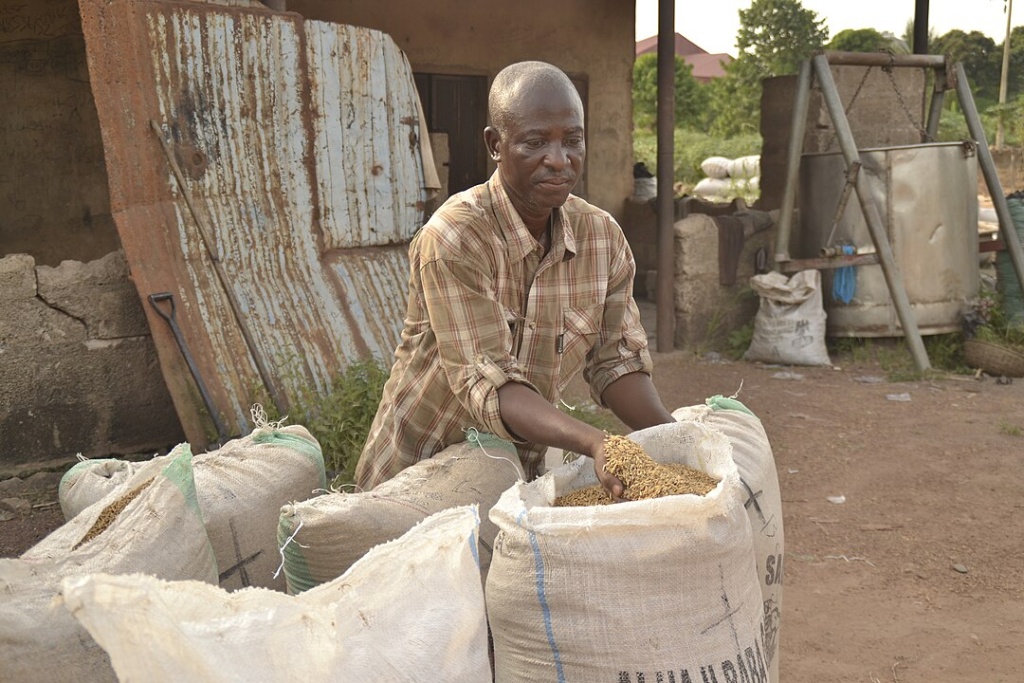
Rice on the way to be milled, By Chukwukajustice, Own work, CC BY-SA 4.0
Trust and Perception
But, Dr Gidado still emphasizes that a shift like GM is not impossible with awareness.
“We’re going to actively use the media to change wrong perceptions,” she tells me with a voice laced with so much certainty you’d think the hesitant were already warming up to the idea. “Our teams are in nooks and crannies to engage the stakeholders like farmers, consumer groups, and environmental organizations in the decision-making process. We’ll listen to their concerns, address them, and involve them in the development and regulation of biotech rice.”
Ijaduola Kayode, an agricultural biotechnologist, gauges Dr Gidado’s sensitization plan warily. It’s not just the publicity or the sensitization; for him, transparency matters more. If you’re changing a system people have known for so long and have attached strong cultural ties to, the least you can do is come clean.
And Chef Obubu co-signs. “I don’t think we can trust the government to be our source of information on what to eat. In the past they’ve lied about the availability of food.” I hear the disgust.
Ijaduola adds, “the success of GMO rice is in the hands of the moral upstanding of the government. If they’ll tell the truth to citizens and their truth is actually true, then people may listen.”
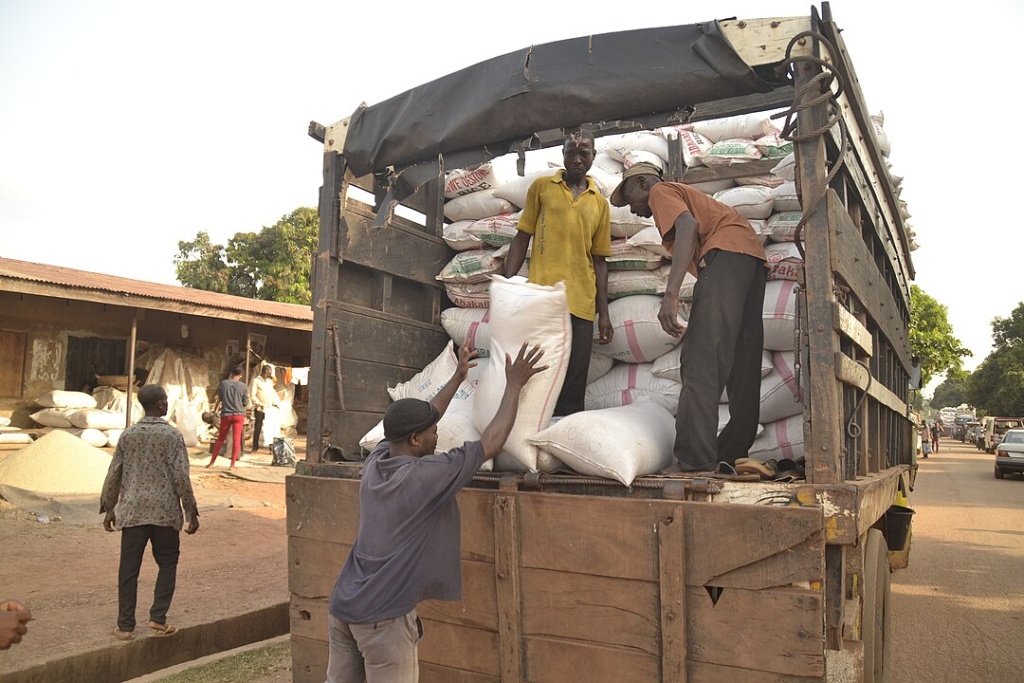
Rice being transported after processing, By Chukwukajustice, Own work, CC BY-SA 4.0
Maybe Dr Gidado foresaw Ijaduola’s and Chef Obubu’s skepticism, or maybe NABDA already has a concrete plan, but, she addresses these concerns in her usual straight-to-the-point, concise way.
“We’re going to implement clear labelling of biotech rice products so that consumers have a choice. We want to respect their right to make informed decisions about what they consume.”
As climate change worsens, with fewer materials to produce food, by her foretelling, there will be less contention with NABDA’s plans.
The plans are already in motion, she told me. “It won’t be like 2016.”
Amidst the guarantee that hefty sensitization campaigns would be carried out to make food tech policies inclusive, and an affirmation that NABDA wasn’t dependent on the government, it was still easy to make out that Dr Gidado is particularly banking on a change in people’s perception of GM rice for the success of its popularization in the future







